When we think about where and how to spend our money on food, a lot of us are drawn in by words like “free-range,” “sustainable,” and “ethical.” It’s no longer enough to just be “organic” and “farm-to-table.”
The modern home chef is a savvy connoisseur whose access to premium ingredients is easier than ever before. Not only will farms deliver to your door, it might be the same produce being served by the best restaurants in your town.
And in the rare case you can’t have it home-delivered, there are bound to be numerous farmers’ markets in your area.
“Those goddamned markets. When the public got access to what only we could get before, we lost our bragging rights. We had to compete for products that made us special,” Loretta Keller, a San Francisco restaurant veteran, told Vanity Fair in a 2015 story about the ubiquity of farm-to-table dining across the U.S.
Of course, there is nothing wrong and everything right about having access to an abundance of food.
It teaches us the value of an apple from Washington state and one from China. Perhaps we will enjoy the California avocado more than the Mexican variety, even if both are stellar and readily available. Or maybe next time you want a Big Mac, you’ll think twice about the provenance of that beef patty and instead get a burger made from cattle raised less than 100 miles away from you.
With this idea of putting an ultra-high premium on our food choices, we sought out restaurants that take their dining experiences a step further — those that not only create incredible food but also grow and raise the ingredients of these culinary experiences.
Capitol Grille and Double H Farms & Gardens
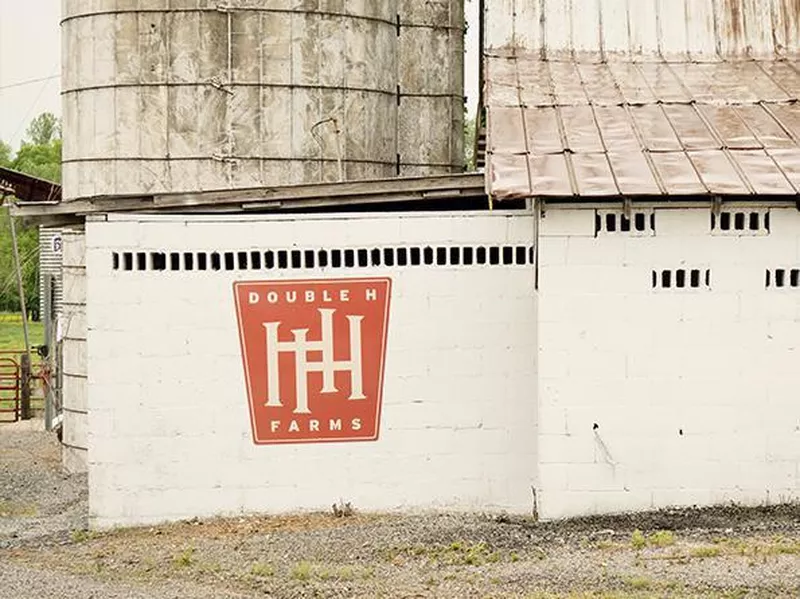
All of the produce used in the Capital Grille kitchen is grown on land within the city of Nashville, and its own herd of cattle are raised just 45 miles away. The Hermitage Hotel
Location: Nashville, Tennessee
Farm: White Bluff, Tenn. (45 miles away)
Garden: Nashville (4 miles away)
Bottom line: Lest you thought hotel dining was all about buffet trays and stale pastries, we bring you Capitol Grille in the Hermitage Hotel.
Nashville locals and visitors alike feast on steaks from the restaurant’s own herd of Red Poll cattle that live on 250 acres of land 45 miles away. And all of the produce used in the kitchen is grown on land within the city of Nashville.
Capitol Grille actually shies away from the term “farm-to-table.” As they put it, they’re just carrying on the Southern traditions of their forebearers by raising their own cattle and farming their own produce. Still, their practices are sustainable and help preserve traditions that date to the 1700s. Cattle live a normal life grazing on grass and roaming the property.
The garden came about through a partnership with the Tennessee Land Trust, which fits right in line with the whole heritage factor. The restaurant operates a garden growing heirloom produce such as watermelon, pumpkin, kale, beets, carrots, turnips, and corn.
Cory Untch took over as chef-farmer in 2016, bringing with him a wealth of knowledge on such dual roles thanks to his time at The Inn at Dos Brisas, which brings us to our next farm restaurant.
The Inn at Dos Brisas
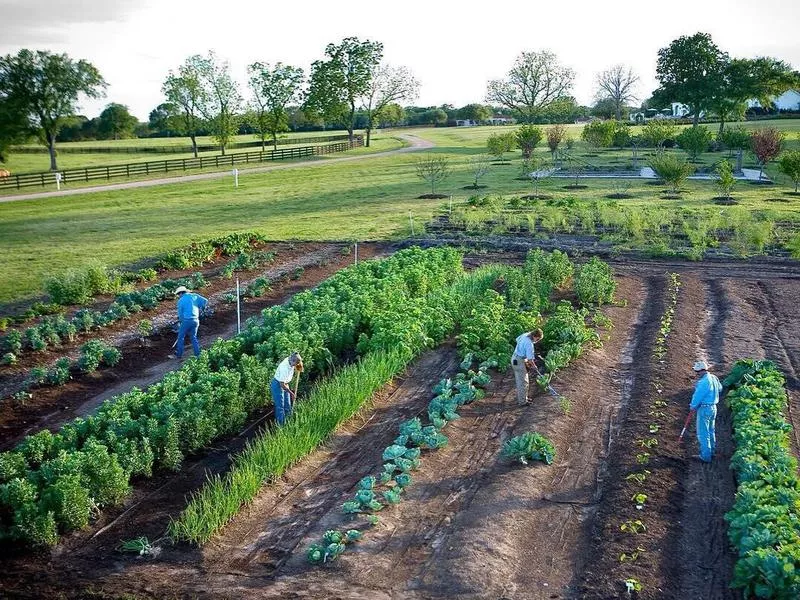
Dos Brisas operates a 42-acre farm planted with heirloom varieties of organically grown fruits and vegetables. Inn at Dos Brisas / Instagram
Location: Washington, Texas
Farm: On site
Bottom line: Next time you’re somewhere between Houston and Austin in Texas Hill Country, kick off your cowboy boots, set down your Stetson, and grab a glass of cabernet at Dos Brisas and chomp on some crudite grown on site.
The Inn at Dos Brisas is another high-end restaurant attached to a luxury hotel. And while the property itself is quite stunning, offering as much or as little of a Texas Hill Country experience as guests desire, it’s the attention to ingredients in the restaurant that makes the place stand out.
Dos Brisas operates a 42-acre farm that’s USDA-certified organic and mostly planted with heirloom varieties of fruits and vegetables, everything seasonally appropriate. An herb garden rounds out the property. And during winter, farming activities are concentrated in a 7,000-square-foot greenhouse in order to keep the menu hyper-local.
Fresh off a massive renovation in 2016, the restaurant is now run by Matt Padilla, who once worked for legendary Nordic chef René Redzepi at his universally lauded Noma restaurant (more on that in a minute). Padilla works side by side with farm manager Steve King, who likes to say Dos Brisas is actually a farm with a restaurant attached to it.
Noma 2.0
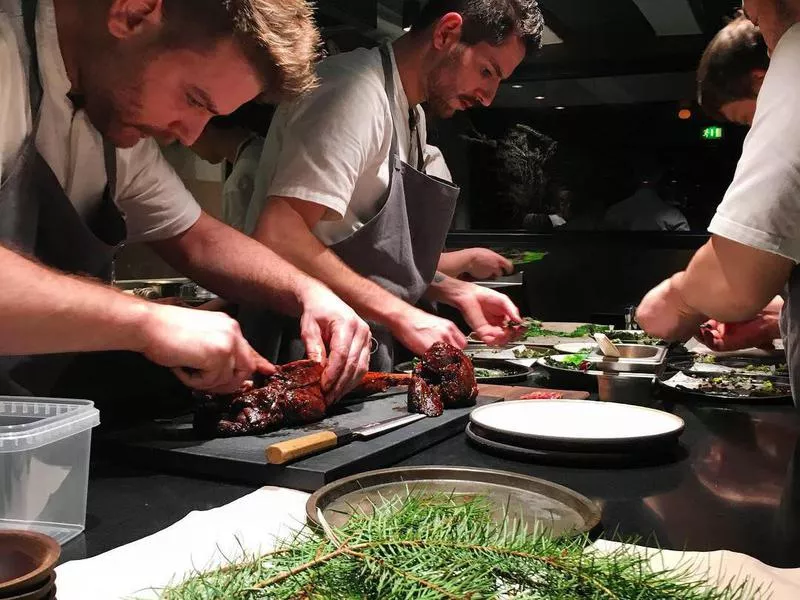
Chefs prepare food at Noma 2.0.
Location: Copenhagen, Denmark
Farm: Copenhagen
Bottom line: Few, if any, restaurants have generated as much buzz in the past decade as Noma, an homage to seasonal eating and Nordic cuisine (it’s OK if you have no idea what that is). Founder and chef René Redzepi is something of a kitchen wizard, and dining at Noma has been described as anything from an out-of-body experience to a meeting with God.
But like any true artist, Redzepi hit a creative wall a few years ago and decided to close the restaurant at the end of 2016. However, like other uber-chefs who’ve packed up their knives while at the top of the food chain — namely, Ferran Adrià of Spain’s elBulli in 2011 — Redzepi was never planning to be out of the game long.
Fast forward to the present and Noma 2.0 is about to reopen, this time in a new location and with its own farm. Redzepi has said for a restaurant of Noma’s caliber and reputation, the farm idea just made a lot of sense — as did bringing his entire staff to Tulum, Mexico for several months this year so they could learn how to make tacos.
Details on the farm aspect are scant, although Redzepi has bandied about the idea of a living roof, replacing asphalt with real dirt, and growing produce on a floating field in a lake. And diners can expect the same attention to detail and quality as before, with plans already set for a fish-centric winter menu followed by a meatless spring and a forager-heavy fall (Redzepi can hunt for wild foods with the best of them). Noma 2.0 has even started to take reservations.
Saison
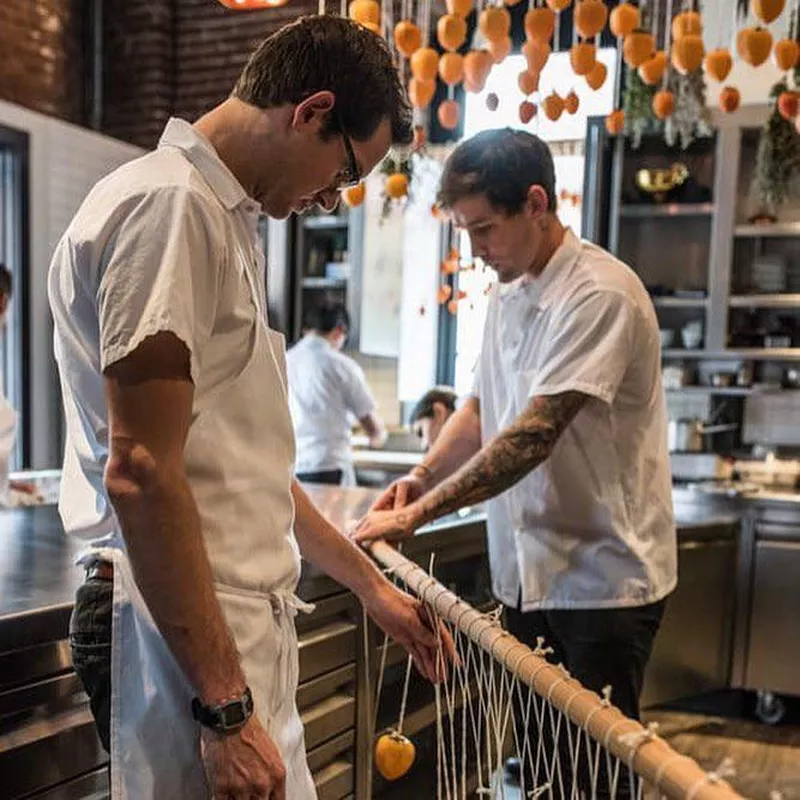
San Francisco’s Saison partners with a farm in Lagunitas, about 30 miles north, for most of its produce and herbs. Saison
Location: San Francisco, California
Farm: Lagunitas (30 miles away)
Bottom line: California is no stranger to incredible restaurants, and many operate their own farms. But few of those restaurants have captured the imagination of foodies and food critics quite like Saison. For one thing, you’re out $398 just for sitting at one of the few seats in house (that’s the going rate for the nightly tasting menu, which is never the same). But no one said culinary nirvana is cheap.
Saison came into the farm operation game having already established itself as a 3 Michelin star restaurant — one of the highest honors worldwide — by doing amazing things with amazing ingredients. Chef Joshua Skenes is obsessive when it comes to his plates of food. And so in 2014, amid an epic drought in California, Skenes and Saison decided to partner with a farm in Lagunitas, about 30 miles north of the restaurant in Marin County.
“It’s very easy to go to the market or order whatever you want, but that doesn’t give you the greatest quality. Cooking what we grow ourselves is also a great way to force creativity,” Skenes told the San Francisco Chronicle in 2014.
At the time, the farm was growing some 100 different types of produce and herbs, including Supai Red parching corn, Tarbais cassoulet beans, Princess Larate and Corolla potatoes, basil, parsley, and cilantro. “We use whatever the farm gives us and use every part of it — it’s seed-to-stalk cooking, just like nose-to-tail,” Skenes said.
The restaurant also uses many foraged goods and shies away from anything premade, electing to instead create all of the dining experiences in house.
L’Espalier
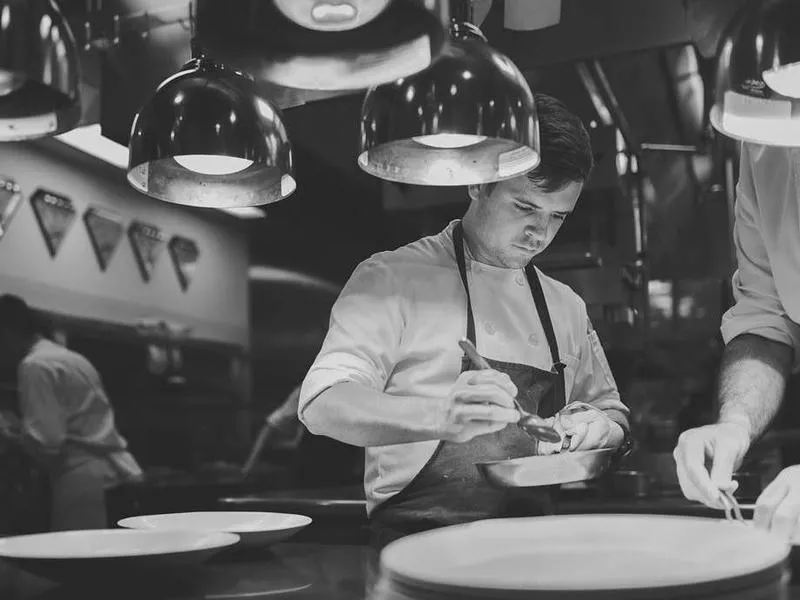
Boston’s L’Espalier serves organic produce and free-range pigs, turkeys, and chickens from its nearby Apple Street Farm. L’Espalier / Instagram
Location: Boston, Massachusetts
Farm: Essex, Mass. (34 miles away)
Bottom line: Anyone in the New England restaurant scene knows the name Frank McClelland, the owner, chef, and farmer for L’Espalier. McClelland’s kitchen has been the proving ground for many of the Northeast’s best chefs, and he is credited with bringing haute cuisine to Boston in the early 1980s.
But McClelland is first and foremost a green thumb, having grown up tilling and sowing the fields of his grandparents’ farm in New Hampshire. It was there he learned how to pick and can produce, bake bread, and make sorbet from fresh fruit. Combine that knowledge with his classic culinary training, and McClelland is the godfather of New England-French cuisine and an early proponent of farm-to-table cooking.
In 2009, McClelland started one of the most ambitious farm-restaurant programs in the U.S. at Apple Street Farm just north of Boston. The sustainably farmed land provides organic produce and free-range pigs, turkeys, and chickens for L’Espalier. In fact, so much food is grown on the 14-acre farm that it supplies other restaurants with produce and runs a community-supported agriculture (CSA) program.
McClelland runs the farm — and lives on the property — so in essence he went from being a revered chef to a revered farmer. McClelland and his four ranch hands are trained in animal husbandry and beekeeping, and McClelland says those bees help increase farm production through pollination. And in 2013, Apple Street became licensed to sell raw, organic milk.
Bell Book and Candle
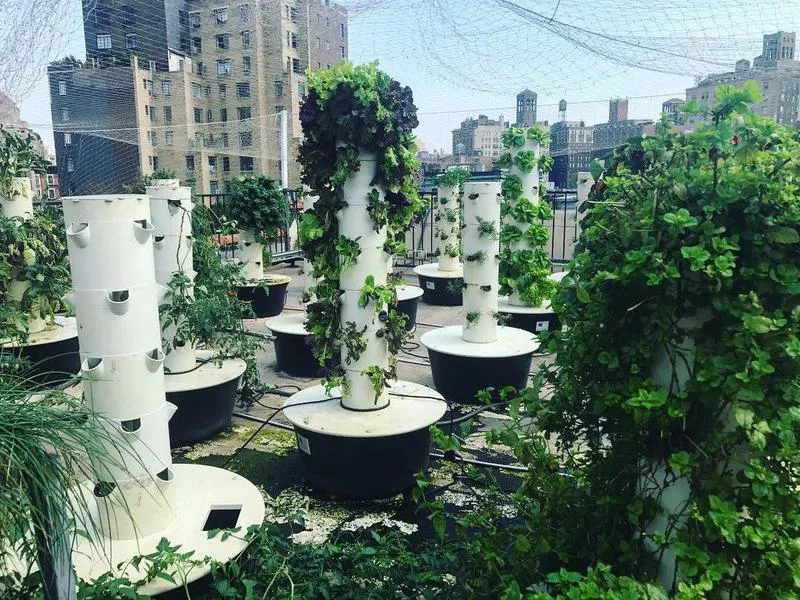
Bell Book and Candle operates its own rooftop garden above its Manhattan location. Bell Book and Candle / Instagram
Location: Manhattan, New York City
Farm: Rooftop above restaurant
Bottom line: New York has an abundance of farmers markets to provide produce and other goods to the thousands of restaurants in the city, but the folks behind Bell Book and Candle decided to take the farm-to-table ethos a bit farther and operate their own rooftop garden.
Such farm spaces are nothing new to New York, as Eagle Street Rooftop Farm and Brooklyn Grange have been growing and selling produce and honey in the city for years.
But John Mooney and Mick O’Sullivan, the pair behind Bell Book and Candle, were the first restaurant to operate their own hydroponic rooftop garden when they opened in 2011. The system was designed by Future Growing of Florida, which specializes in Tower Farms that pack a bunch of produce into a small space — perfect for a dense city like New York.
Not everyone has been impressed with the rooftop garden — a New Yorker article in 2011 panned the produce, saying it tasted of exhaust fumes — but others, like Zagat, have praised the food.
Mooney and Sullivan say they can grow food on the rooftop for about 10 months out of the year, thanks to the hydroponic system that feeds the plants with a nutrient-rich water solution that can be heated up, keeping the roots from freezing. The garden has also attracted bees, which means it’s an inviting enough space for nature’s top pollinator.